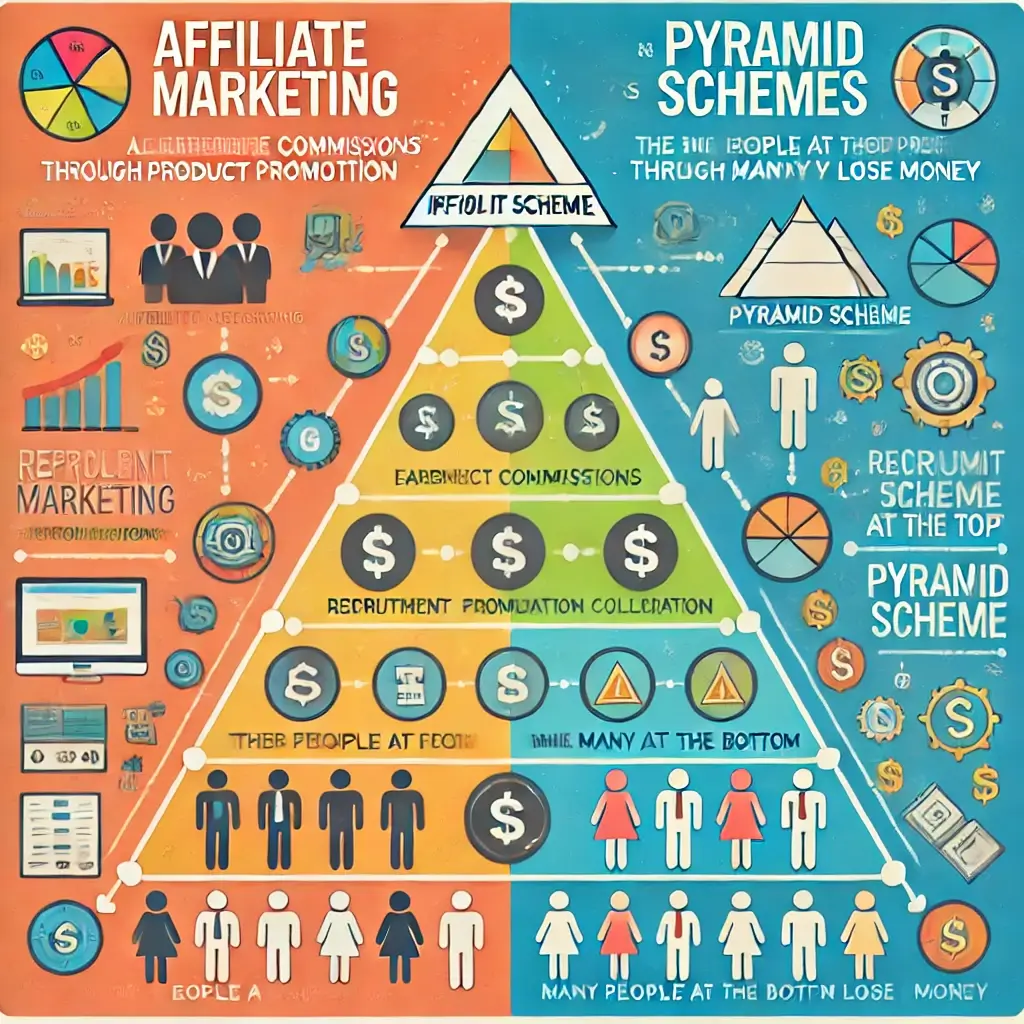Is Affiliate Marketing a Pyramid Scheme? A Clear and Neutral Analysis

Last updated on October 27th, 2024 at 05:05 pm
Is Affiliate Marketing a Pyramid Scheme?
Affiliate marketing lets you earn money online by promoting products and earning commissions for each sale.
Pyramid schemes are illegal and unsustainable, often leading to financial losses.
While some aspects of affiliate marketing may seem similar, the key difference is the focus on sales rather than recruitment.
It’s important to research any affiliate marketing program to ensure it’s legitimate and not a pyramid scheme.
Understanding Affiliate Marketing
Definition and Mechanics
Affiliate marketing is a type of online marketing in which a business rewards one or more affiliates for each customer brought about by the affiliate’s marketing efforts.
The affiliate typically promotes the business’s products or services through a unique affiliate link or code, which tracks the affiliate’s referrals and sales.
In affiliate marketing, the business pays the affiliate a commission for each sale made through their unique link or code.
The commission rate varies depending on the business and the affiliate program. Some businesses offer a flat rate per sale, while others offer a percentage of the sale.
Affiliate marketing is a cost-effective strategy businesses use to promote their products or services.
It enables them to reach a wider audience through affiliates’ marketing efforts, eliminating the need for traditional advertising expenses.
Comparison to Traditional Marketing
Affiliate marketing offers several advantages over traditional marketing.
It is performance-based, so businesses only pay for results, unlike traditional advertising where payment is made for exposure regardless of sales.
It allows businesses to reach a wider audience through affiliates’ efforts, as affiliates promote products to their followers.
It is often more cost-effective, with businesses paying lower commission rates compared to traditional advertising costs.
Affiliate marketing helps businesses increase sales and reach more customers while affiliates earn commissions for their efforts.
Exploring Pyramid Schemes

Characteristics of Pyramid Schemes
Pyramid schemes are fraudulent business models that promise quick and easy profits.
They rely on recruiting new members for revenue instead of selling products or services.
Participants pay a fee to join and earn money by recruiting others, creating a pyramid-like structure.
These schemes often make unrealistic promises about potential earnings.
As the scheme grows, recruiting becomes harder, leading to a collapse where many lose their investment.
Legal Status and Examples
Pyramid schemes are illegal in many countries, including the United States, where they are prosecuted as fraud under federal and state laws.
The Federal Trade Commission (FTC) enforces these laws and has taken action against companies operating pyramid schemes.
Notable cases include Bernie Madoff’s Ponzi scheme and the accusations against Herbalife by Bill Ackman.
Herbalife’s FTC settlement showed the fine line between legitimate MLMs and illegal pyramid schemes.
Pyramid schemes focus on recruitment and promise unrealistic earnings. Evaluate business opportunities carefully.
Distinguishing Affiliate Marketing from Pyramid Schemes
Revenue Sources
One key difference between affiliate marketing and pyramid schemes is their revenue sources.
In affiliate marketing, the revenue comes from sales of products or services to customers.
Affiliates earn a commission on each sale they generate through their unique affiliate link.
On the other hand, pyramid schemes generate revenue mainly through the recruitment of new members.
The focus is on recruiting more people into the scheme, rather than selling products or services.
Recruitment and Compensation
Another way to distinguish affiliate marketing from pyramid schemes is through their recruitment and compensation structures.
In affiliate marketing, affiliates are not required to recruit other affiliates to earn commissions.
They can focus solely on promoting the products or services to customers.
In contrast, pyramid schemes often require members to recruit new members to earn compensation.
Read also: Make Money on Cash App in Minutes: Tips and Tricks
Product and Service Focus
The focus on products and services distinguishes affiliate marketing from pyramid schemes.
In affiliate marketing, the emphasis is on promoting and selling products or services, with affiliates often receiving training and support.
Pyramid schemes, however, focus on recruiting new members and earning commissions from recruitment rather than selling products.
Key differences between the two include their revenue sources, recruitment and compensation structures, and product focus.
Understanding these differences is crucial for making informed decisions about participating in such programs.

Legal and Ethical Considerations
Regulatory Bodies and Laws
Affiliate marketing is a legitimate business model, but it is important to comply with relevant laws and regulations.
The Federal Trade Commission (FTC) is the primary regulatory body in the United States that oversees affiliate marketing.
The FTC requires affiliates to disclose their relationship with the merchant and any compensation they receive for promoting the product.
Failure to disclose this information can result in penalties and legal action.
Affiliates must understand laws like the CAN-SPAM Act for email marketing and GDPR for data protection in the EU.
Read also: The Best Way To Check Voters Card ID Numbers in Nigeria
Ethical Marketing Practices
While affiliate marketing can be a lucrative business, affiliates need to engage in ethical marketing practices.
Affiliates should also be transparent with their audience and provide honest and unbiased reviews of the products they promote.
This builds trust with the audience and can lead to long-term success in the affiliate marketing industry.
Affiliates must follow laws and use ethical practices to build a successful, sustainable business.
Best Practices in Affiliate Marketing

Choosing Reputable Programs
When choosing an affiliate program, it is important to do your research and only work with reputable companies.
Look for programs that have a proven track record of success and a good reputation within the industry. Consider factors such as commission rates, payment terms, and the quality of the products or services being promoted.
Transparency and Disclosure
Transparency and disclosure are key components of ethical affiliate marketing.
Always disclose your affiliate relationship through a website disclaimer or social media posts.
This helps to build trust with your audience and ensure that they understand the nature of your relationship with the company you are promoting.
Building Sustainable Partnerships
Building sustainable partnerships with affiliate programs is crucial for long-term success.
Work closely with affiliate partners to align your promotions with their brand values.
It also means being open and transparent about your goals and expectations and working together to achieve mutual success.
Following best practices helps affiliate marketers build ethical, successful partnerships.
Read also: Get Paid from Etsy in Nigeria: The Best Guide for Nigerian Sellers
Evaluating Business Opportunities
Research and Due Diligence
Before investing time and money into any business opportunity, it is essential to conduct thorough research and due diligence.
This involves gathering information about the company, its products or services, and its compensation plan.
Reading reviews and testimonials from current and former affiliates is an effective research method.
It offers insights into the company’s culture, support system, and overall satisfaction.
Researching a company’s finances, legal history, and regulatory compliance can reveal its legitimacy and long-term potential.
Identifying Red Flags
Affiliate marketing can be legitimate, but many pyramid schemes and scams exist.
Red flags include compensation plans favoring recruitment, exaggerated income claims, pressure for quick decisions, and lack of product transparency.
Being aware of these signs and conducting thorough research helps individuals avoid scams and make informed decisions.

Conclusion
Affiliate marketing is a legitimate business model offering benefits to both merchants and affiliates.
Unlike pyramid schemes, it does not require upfront investment or recruiting others.
Affiliates earn commissions by promoting products, while merchants gain increased sales and brand exposure.
Despite similarities like the potential for passive income, pyramid schemes are illegal and unethical.
Understanding these differences helps individuals make informed decisions and avoid scams.
